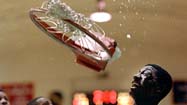Teacher responses to the 2010 release
The following is a list of teacher responses to their "value-added" ratings during the intial release in 2010. See the most recent responses »
The Times gave LAUSD elementary school teachers rated in this database the opportunity to preview their value-added evaluations and publicly respond. Some issues raised by teachers may be addressed in the FAQ. Teachers who have not commented may do so by contacting The Times.
|
|
 Delicious
Delicious
|
 Digg
Digg
|
 Facebook
Facebook
|
 Twitter
Twitter
|





Students enter their new classrooms each school year with the previous grade's knowledge. A few are near grade level, but many are far below whether it's due to language or diagnosed/undiagnosed learning issues. Test scores are affected by student readiness and level of difficulty. It is a teacher's job, my job to motivate and prepare everyone by teaching from the California standards in every subject, not to teach to the test. I also want to get to know my students. Some teachers prepare for the tests at each grade, and some teachers teach in hopes of preparing lifelong learners. Almost daily after school homework (except for a once a week meeting day) help is offered by me at no extra pay for those who need the academic support. However only a few students accept it. No matter what the statements of one newspaper may be (by quoting questionable research) please know that education is a process which takes a great deal of my time, community support, and student input. The results of a good foundation may not be measured by impersonal assessments only. Actually, I've seen good results in my students in letters or visits from them years later.
August 16, 2010 at 11:49 p.m.
First of all, thank you for conducting this study. Obviously, I would have wanted my effectiveness to be "value added" to the top of the scale. I would have to do a lot of soul-searching, analysis, and self-critiquing to determine the areas in which I need to improve. However, I have constantly practiced self-critiquing and soul-searching and individual analysis in the past. To find the answers needed to improve my effectiveness as a teacher, I think I (and other teachers) need to go "out of the box" to find a solution. Value-added measures of performance point out the necessity for different solutions.
I hope that teachers will respond as life-time learners in addressing the needs of our students, rather than boycotting or condemning the messenger, the Los Angeles Times.
August 16, 2010 at 10:25 p.m.
Your could get better picture of a teacher's ability to look at test scores and modify their teaching accordingly to improve test scores if you would show a year by year value added score, including the 2008-2009 academic year.
August 16, 2010 at 10:18 p.m.
I take teaching very seriously, and, like my colleagues, work very hard to do my best for my students and improve their achievement levels. As you can imagine, I was dismayed and disheartened to see that your value-added model placed me in the category of least effective teachers. My students' May 2010 results, which I first saw today, were more encouraging to me. I noted that my students' mean math score was within 2% of the LAUSD's mean math score. This is an indication that I am significantly closer to the 50th percentile, and it represents improvement on my part. Rest assured that I will continue to work hard on improving.
The use of a value-added model is in the process of development. This model is unproven and controversial, and it can provide inconsistent and greatly fluctuating results for the same teacher. Is it likely that one individual is a good teacher one year and a poor teacher the next? Or is it more likely that other variables need to be sorted out and accounted for in the model? To print results in the LA Times is premature and imprudent since you don't really know whether a teacher's failure to meet the projection is the result of poor projecting or poor teaching.
August 16, 2010 at 9:49 p.m.
I strive to assist each of my students reach their potential. How much my students improve depends not only on me, but also on student motivation and parental support.
When administering the CST in language arts this year, I was concerned with the developmental appropriateness of the test. I had prepared my students for this portion of the test by teaching the designated standards as well as comprehension strategies. There were a substantial number of stories with questions for the students to answer, pages and pages of them. My students looked at me for help as they turned the numerous pages of this section to determine where they would stop. I felt a tug on my heart as I looked at their overwhelmed faces. Do they really need to read so many stories for their comprehension skills to be assessed? I don't need to run a marathon for someone to assess whether I can run. I wonder how many of my students gave up as a result of mental fatigue? I'm not making excuses. My goal for this year is to focus more on testing stamina. Even an effective teacher can teach all the strategies and standards necessary and not see the level of performance he/she had hoped for due to poor testing design. I vow this school year to prepare my students to meet and surpass the challenges of this test, particularly in language arts. I don't ever want to see those overwhelmed faces again that are still etched in my heart. We will prevail!
August 16, 2010 at 9:47 p.m.
Being an educator, as well as a parent, my belief is that a quality education is not only valuable but and indispensable opportunity that is given to a child in securing a successful future. I also believe that teachers are the single most important school related factor in a child’s education. Unfortunately, parents have had no objective information about the effectiveness of their child’s teacher, until now. However, as an educator, I have been fortunate to have had the opportunity that other parents haven't in being able to use my professional objectiveness in choosing teachers for my own children every year.
From experience at my own school with my own colleagues, as well as at my children's school, it is unfortunate that I have felt the need to "Hand pick or request" teachers for my children, because I myself see the difference between educators within a school. The honest truth is that not all teachers are "Quality" teachers. The reality is that some teachers call themselves teachers, but do anything but teach. I firmly believe that it is the right of the parents to be able to ensure that their child is given an opportunity for a quality education, hence the reason why I choose whose classroom my children enter each year.
The sad thing is that even though some teachers like myself score more effective than average, it doesn't mean much to school districts or to the state of California. I have proven to be an effective teacher, but I also am one of the many quality teachers who have been laid off in California. There is nothing in place for the state of California to ensure a quality education for our children. Because of that, many great teachers have been laid off and many noneffective teachers have been left to supposably "Teach" our children. In other professions, this is far from the truth. If you are not performing effectively in your position, it doesn't matter how many years you have worked there, your services will no longer be needed.
Fortunately, being that I am a laid off educator, I now hold the opportunity to instill a quality education in my own children by using my "Effective Teaching Strategies" while homeschooling my kids. I will not let my children be at the expense of a teacher's lack of knowledge to educate just because that teacher has tenure.
August 16, 2010 at 8:20 p.m.
Although the test scores are an indication of the student's ability and/or performance level, it is not the complete picture. The emotions felt during the test can effect the results. The maturity and/or attitude of the test taker can effect the test. While the teacher is an important factor, the support of the parents does play a major role in the success of the student. Non-random assignments by teachers, administrators, and/or designees does affect the make-up of the class if the class is not balanced especially in the area of discipline which greatly affects the learning that takes place. In my experience, teachers have had both pre-announced and unannounced classroom visits several times during the school whether they are being officially evaluated or not. The evaluation system should be changed and the evaluators need to specifically trained with effective procedures. The language arts portion of the test does seem to be more difficult for the student to comprehend; in third grade this is due partly to the fact that second graders have many more portions read to them.
August 16, 2010 at 7:33 p.m.
I do not believe that this scoring system is a fair assessment of a teacher's efficacy due to the amount of time teachers spend planning with their colleagues before, during, and after the school year to discuss improving instructional practices in order to meet the needs of the diverse student population of LAUSD. Not to mention that these hours of planning are above and beyond the alloted time in a school day.
In each classroom there is a myrriad of instructional levels that we are required to increase to a prescribed benchmark for that grade level. We accept this daunting task even with a lack of sufficient and equitable resources that should be provided by the district, without complaint. Finally, here is a glimpse into the mind of an LAUSD teacher:
1. How do I teach my students how to use technology without working computers?
2. How do I bridge the academic gap for students who could not attend summer school?
3. How does one school have current textbooks while another school, within the same district, does not and yet they are both expected to have the same results?
4. Why do some teachers spend their own money, every summer and throughout the school year, for much needed classroom materials to help students achieve?
5. Why are we not holding the students' "first teacher" accountable?
6. How does the students' home life affect their academic performance?
The powers that be are expecting the maximum result with a minimum of district support, resources, and encouragement. You cannot place a business model of mass production unto the system of educating unique
individuals.
August 16, 2010 at 7:01 p.m.
I think it an unfortunate trend in education, when the ship of thought steers so profoundly in the direction of teaching small children to read short passages, and to respond by choosing from four multiple choice answers to questions. I can't remember the last time I heard a faculty meeting discussion of good books to hook children on reading, before they are irretrievably drowned in the present culture of bytes. I feel profoundly sorry for children caught up this less rich exposure to learning.
August 16, 2010 at 5:58 p.m.
I've kept an eye on this since the LAUSD adopted the 'Open Court' program. That's where the ENGLISH score comes from.
I have also spent WAY too much math time on factors and multiples, the base of the math pyramid, rather than teach the 'Key Standards' that the LAUSD 'believes' will appear on the spring state test.
I also taught U.S. History, Science and Physical education, logically, taking time away from the 'Key Standards'.
Can I do better? There will be years. 2003 my class scored above the state and district averages in every category except two. That did not make it into my average. I did not administer the test in 2009 and that did not make it into my statistics. Would THAT have made a difference? We will never know.
Is this embarrassing? Who wouldn't be? If I was in the Major Leagues I would be on the bench - which I am being a housed teacher - or sent down to the minors until my slump ended.
August 16, 2010 at 5:54 p.m.